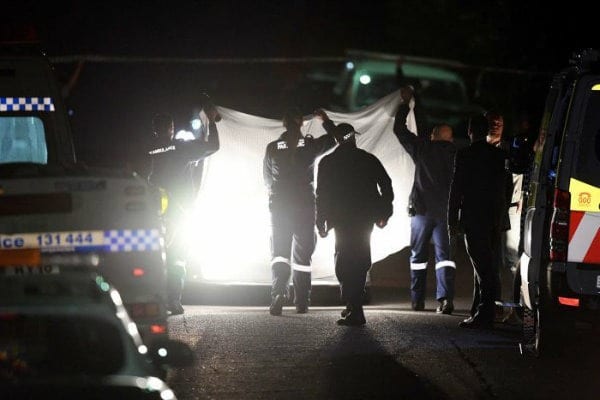Three women – two in Victoria and one in New South Wales – were violently killed on Saturday and in each instance a man reportedly known to their victim was arrested.
According to the Counting Dead Women Australia researchers of Destroy The Joint it takes the number of Australian women violently killed in 2018 to 34.
Thirty four women killed in 27 weeks.
In the early hours of the 7th of July 2018 NSW police attended a house fire and found Jan Garret, a 76 year old resident of Raymond Terrace, dead. A man believed to be her carer has been arrested in relation to the fire explosion and is being held in custody.
At 10.30am on Saturday morning Victorian police found Amanda Harris, a 36-year-old child care worker and mother-of-three, had been stabbed and lit on fire at her home in Melbourne’s Cranbourne North. Despite attempts to save her she died. A 38 year old man, believed to be Amanda Harris’s partner, was arrested at the scene in the presence of three young children.
Less than six kilometres away, in Hampton Park, just a few hours late, Victorian police attended another murder scene. Another woman killed. The woman has not been identified but the man remanded in custody is believed to be known to the victim.
This all happened less than 48 hours after John Edwards, a financial planner in Sydney, tracked down his two teenage children and shot them both dead.
It happened less than a week after Queensland police confirmed the body discovered in a barrel on the back of an abandoned ute was the 16 year old Larissa Beilby who had been missing for weeks.
It happened less than a month after Eurydice Dixon and Qi Yu were murdered.
Thousands of people fill Princes Park in vigil for #EurydiceDixon: https://t.co/q28KXgnIPz pic.twitter.com/HKUF3ELWhb
— ABC Melbourne (@abcmelbourne) June 18, 2018
That is eight innocent victims of violence in a single month. Eight people forever gone. Countless more lives forever marked by this brutality.
If eight Australians had been killed in other circumstances – terror or negligence – tell me we wouldn’t have a task-force formed by now?
Tell me we wouldn’t have had press conferences and flags and sombre declarations about the need to confront this unacceptable threat to the safety of Australians head on.
Tell me we wouldn’t have legal changes being mooted, inquests underway and virtually perpetual media coverage?
ABC 7pm news top two stories: the two children murdered by their father, and domestic violence suspected in death of woman in a house fire. Imagine if these were terrorism-related deaths.
— Juanita Phillips (@Juanita_Phillip) July 7, 2018
There is certainly sadness and remorse and grief and condolences but there is no sense of urgency.
It has been said before but I will say it again because it hasn’t changed.
We do not treat domestic violence, and violence against women, with the same urgency with which we approach other threats.
With every life taken the absurdity and inequity of this becomes clearer and less palatable.
If a single man had occasioned eight deaths in a month there would, understandably, be a national man-hunt of an unprecedented scale to capture the assailant. The magnitude of the operation would be vast and it would be hard to imagine a limit being imposed on the cost. Surely, we’d just pay whatever amount necessary to find the perpetrator and bring them to justice?
Yet when eight women are killed in seven separate incidences there is no co-ordinated response. Resources seemingly aren’t thrown at tackling the problem. There is no ‘at any cost’ mentality when it comes to tackling domestic violence.
A jarring illustration of the chasm between what we frame as “real crime” and the sad, almost inevitable nature of DV-related deaths, unwittingly perhaps, came from Channel 7 yesterday.
https://twitter.com/Meshel_Laurie/status/1015562737395482625
It is easier to pretend that ‘gangs’ represent the greatest danger to our safety. That ‘threats’ look and act in a certain way and it’s different from “us” (whatever “us” is).
Accepting that danger lurks in people we know, in houses we believe we understand, in lives like our own is terrifying. It’s complicated and ugly to confront.
But there is an uglier more terrifying, more confronting prospect. And that is accepting that we are willing to accept waking up to news of teenagers being slaughtered, of mothers and grandmothers being burnt to death, of young women being raped and beaten and stabbed and left to die. Accepting that is too terrifying to contemplate.
There is no single simple fix to domestic violence but there are things – big and small – that can be done. There are frontline services that can be adequately funded. There are experts whose wisdom and understanding can be engaged in developing and implementing policies to reduce and manage DV. There are laws that can be changed. There is a culture we can shift.
There are 34 reasons this year alone that these changes need to happen.
If you or someone you know is impacted by sexual assault, domestic or family violence, call 1800RESPECT on 1800 737 732 or visit 1800RESPECT.org.au.
In an emergency, call 000.
For information about local services, download the DAISY app for iPhone and Android


